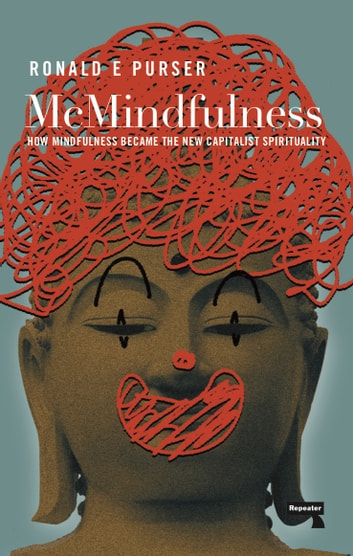In this book summary of McMindfulness: How Mindfulness Became the New Capitalist Spirituality, I set out Ronald Purser’s key objections to McMindfulness and give my own brief review of the book.
Buy McMindfulness at: Amazon | Kobo (affiliate links)
Key Takeaways
Purser doesn’t object to mindfulness per se, or even to people who promote it. He accepts that mindfulness can help people. He just objects to “McMindfulness”, which he calls the form of mindfulness popularised by Jon Kabat-Zinn.
Purser’s main objections to McMindfulness are:
- The promoters “switch” Buddhism on and off to suit their needs.
- However, McMindfulness does not truly reflect Buddhist teachings as it has been decontextualised and commoditised.
- McMindfulness perpetuates the status quo by blaming individuals for problems like stress and anxiety instead of broader societal causes like neoliberalism, greed and individualism. Contrary to what some of its proponents belief, McMindfulness will not create a more just society.
- The science behind mindfulness is far weaker than commonly believed.
Detailed Summary
The promoters of McMindfulness switch Buddhism on and off to suit their needs
Kabat-Zinn and other promoters of McMindfulness lean on Buddhism to give mindfulness an aura of credibility when it suits them; but decouple it from Buddhism when pitching to those wary of the religious angle (e.g. companies, schools):
The Buddhist switch is off when addressing public-sector funding agencies, which require secularity, but flipped back on for those more welcoming of Buddhism.
However, it’s misleading to suggest that McMindfulness accurately reflects Buddhist dharma because those same promoters have decontextualised and commoditised it to make it more widespread.
McMindfulness has been decontextualised and commoditised
Mindfulness is widespread. At the time of writing, it was around a $4 billion industry. One consultant Purser met charged $12,000 a day to deliver a corporate mindfulness program.
To make mindfulness so widespread, promoters have stripped it of its original context. They have reduced it to a technique that can be applied in any context, without questioning what purpose it ultimately serves. Corporate executives use mindfulness to increase profits while US soldiers use it to kill more effectively. This runs completely counter to Buddhist teachings, which clearly prohibit intentional killings.
Part of what has made mindfulness so popular is that it’s a cheap and easy way to treat mental health issues. There are no professional or legal qualifications needed to become a “mindfulness teacher”. You don’t need to be a therapist or have formal mental health training.

McMindfulness blames individuals for their problems and supports the status quo
This does not reflect its original Buddhist roots (Purser himself is a Buddhist). Mindfulness and being present is only a small part of Buddhism. Buddhism recognises that the “self” is a construction, and that part of our suffering comes from being attached to it. Buddhism also emphasises ethics, connectedness and community. It doesn’t teach individuals to ignore their suffering, but to use it as a guide to what needs changing—both in the world and in our own response.
[Being present] is the ultimate goal in [Mindfulness-based Stress Reduction], yet merely the first step in Buddhist mindfulness teachings based on the Satipatthana Sutta.
… Deeper levels of practice develop clear insight into all constituents of temporal experience as inconstant and unsatisfactory. When seen clearly for what it actually is, the present moment is like any other mental object — a transitory fabrication to be viewed with dispassion rather than fetishized…
In contrast, the current mindfulness movement discourages such focus and teaches people to observe their thoughts without judgement. It’s an individualist and passive approach that implicitly supports the status quo. Purser even suggests it’s not that different from being a a drug addict, “sedated into zombified oblivion”.
A truly revolutionary mindfulness would challenge the Western sense of entitlement to happiness irrespective of ethical conduct. However, mindfulness programs do not ask executives to examine how their managerial decisions and corporate policies have institutionalized greed, ill will and delusion.
Mindfulness advocates occasionally suggest that the practice will somehow result in more justice. Yet this is simply wishful thinking. There is no evidence that McMindfulness (detached from ethics) makes people generally more compassionate. Norwegian terrorist Anders Breivik for example claimed to use meditation to “numb” his emotions. Heinrich Himmler, head of the Nazi SS, liked yoga and meditation and even planned retreats for elite SS members. He thought yoga could help soldiers mentally prepare for battle and process stress.
For mindfulness to truly be revolutionary, it should not fetishise the “present” moment or withhold judgment. Instead, it should adopt a communal focus and look to both the past and the future as well.
The scientific evidence for mindfulness is quite weak
The science around mindfulness and meditation is still in its infancy. fMRI simulations may look visually impressive but can be misleading.
Studies are hampered by lots of self-reporting, positive publication bias, and failures to distinguish between different forms of mindfulness training. Research into associated areas of stress and happiness are also very vague. There is a particular dearth of evidence around the effectiveness of mindfulness apps and teaching mindfulness in schools. Mindfulness apps may even backfire—if you use an app and see no benefits, you may feel more anxious.
Mindfulness also has adverse effects and is not suitable for everyone. It could stir up strong, negative emotions in a people who have experienced trauma or psychiatric disorders. Other negative effects can include anxiety and panic, increases in tension, impaired reality testing and mild dissociation. Proponents of mindfulness often overlook those possible negative effects.
My Thoughts
I confess I didn’t read this book as carefully as I normally do. There were several reasons for this.
Tone
First, I found Purser’s polemical tone difficult to read. I appreciated hearing the counterargument to mindfulness, because it’s something I’ve personally had mixed views on, and the book seemed to have some valid points. However, I feel Purser’s zealotry undermined his arguments. He didn’t come off balanced or objective at all; he just sounded like he had an axe to grind.
For example, he sets up a false dichotomy between practising mindfulness (or even McMindfulness) and being politically active:
The ideological message is that if you cannot alter the circumstances causing distress, you can change your reactions to your circumstances. In some ways, this can be helpful, since many things are not in our control. But to abandon all efforts to fix them seems excessive.
Yet the message that if you cannot alter your circumstances, you can instead change your reactions to them does not equate to abandoning all efforts to fix them. It’s entirely possible to practise mindfulness and be politically active. Perhaps there is a link between practising mindfulness and becoming less politically active, but Purser did not produce any evidence to show it.
Another example of the book’s distractingly polemical tone is how Purser treats “neoliberalism”, “capitalism” and “individualism” as self-evidently bad things without really defining them. The definition of “neoliberalism” that he does refer to is a caricature:
Perhaps the most straightforward definition of neoliberalism comes from the French sociologist Pierre Bourdieu, who calls it: ‘A program for destroying collective structures which may impede the pure market logic.”
Purser consistently assumes that “neoliberalism” is the cause of modern stress without any supporting evidence. But stress has many possible causes. Why lay all the blame at neoliberalism’s feet?
I mean, he may well have a point about McMindfulness preserving the status quo and inhibiting social progress. If a lot of mindfulness research is being bankrolled by right-wing conservatives and evangelicals (as he alleges), that would be worth digging into. But I just didn’t trust Purser to provide any balance. I expect these right-wing organisations donate to a variety of causes, some of which will not have any bearing on politics at all. I also suspect you could easily identify left-wing organisations that fund mindfulness research. Instead of anticipating and convincingly rebutting such objections, Purser just makes his same points over and over.
Straw man?
Frequently, I felt Purser was attacking a straw man. For example, he writes:
Mindfulness is all very well as a basic coping device, but as a revolutionary strategy it seems empty.
As a casual observer of the McMindfulness movement, I’d never heard anyone claim that it was a revolutionary strategy. The mindfulness push appears similar to the push to exercise or eat well. Many people go around extolling the benefits of eating well, but no one’s claiming it’s going to save the world, end poverty and create justice for all.
Mindfulness is arguably different in that it has an element of passivity and acceptance that eating well does not. I can even accept that some people have made unrealistic claims that mindfulness could eventually lead to justice and world peace. But Purser pushed this point a bit too hard, and even the quotes he pointed to did not make very strong claims (they just said mindfulness “could”, “may” or “had the potential” to be revolutionary, not that it “would” be).
Repetitive
The last reason I didn’t read McMindfulness as carefully as I normally do is because the key points came through clear enough anyway. Despite being a short book (304 pages), it was repetitive and rant-y. Much of the space was spent on quotes and specific examples to support Purser’s points, which were not particularly complex.
Recommendation
Would I recommend McMindfulness? Not really.
I love the term “McMindfulness” as it perfectly encapsulates so much of Purser’s objections to the version of mindfulness currently in vogue. But, like with Bullshit Jobs, Purser had (co-)written a viral Internet article (Beyond McMindfulness), which he then stretched out into a book. Although at least in Bullshit Jobs, I felt the underlying topic was worth an entire book (even if Graeber did not do it justice) whereas I’m not sure the same could be said of mindfulness.
If, despite my review above, you still want to buy McMindfulness, you can do so at: Amazon | Kobo <– These are affiliate links, which means I’ll earn a small commission if you make a purchase through these links. I’d be grateful if you considered supporting the site in this way! 🙂
Am I being too harsh on McMindfulness? Do you think the book is worth a closer read? Share your thoughts in the comments below!
